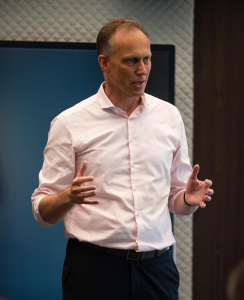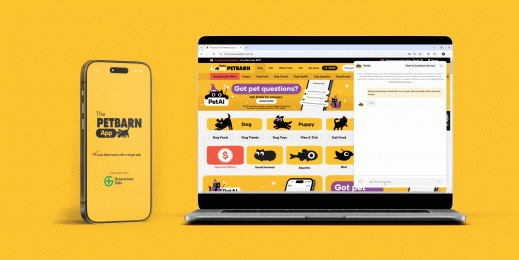
Empowering financial freedom: How Colonial First State is using AI to transform wealth management
Colonial First State (CFS) is one of Australia’s leading wealth management companies, with around A$150 billion in assets under management and almost 1,000,000 members. It has helped more than three million Australians with their investment, superannuation and retirement needs since 1988.
CFS views AI as key in its mission to help Australians achieve financial freedom in retirement. The company is an early adopter of generative AI technologies such as Copilot for Microsoft 365 and Azure OpenAI Service, experimenting with these tools to drive innovation and differentiation in the market.
Microsoft caught up with Jeroen Buwalda, Group Executive of Transformation, Technology and Operations at CFS, to learn more about the company’s AI journey and how this technology can drive innovation in the Australian wealth management industry.
Microsoft (MSFT): To start, how has Australia’s wealth management industry evolved in recent years and what are its main challenges?
 Jeroen Buwalda (JB): The sector has seen a massive amount of change in recent years. Australians currently have about A$3.7 trillion* in superannuation, thanks to our country’s unique superannuation system which has been incredibly successful at building wealth for retirement. In fact, it’s made Australia one of the top nations globally in pension and retirement markets. So, it holds an incredibly important responsibility to help Australians manage their wealth effectively.
Jeroen Buwalda (JB): The sector has seen a massive amount of change in recent years. Australians currently have about A$3.7 trillion* in superannuation, thanks to our country’s unique superannuation system which has been incredibly successful at building wealth for retirement. In fact, it’s made Australia one of the top nations globally in pension and retirement markets. So, it holds an incredibly important responsibility to help Australians manage their wealth effectively.
However, the industry has become quite complex, particularly concerning superannuation rules which can be challenging even for experts in the area. It also faces other challenges like a scarcity of financial planners. For the average Australian, access to financial advice is costly, with a financial plan ranging from $3,000 to $5,000, which is unaffordable for many.
Another issue is that many Australians aren’t engaging frequently enough with their personal wealth. Our research has shown that Australians who plan early and engage with their super and financial advice have much greater certainty over when they retire, feel more confident about their financial position and are more likely to enjoy their retirement. With over three millions Australians expecting to retire in the next ten years, there is an urgency to ensure they are entering that stage of life with confidence and financial security.
MSFT: How can AI help address these challenges and help grow Australia’s wealth management sector?
JB: AI – and especially generative AI – has a remarkable ability to make sense of vast amounts of data and present it in an easily understandable format. That’s incredibly valuable given the complex and engagement-heavy nature of the wealth management industry.
AI’s capacity for personalisation is also very beneficial. For instance, recognising changes in member behaviour which allows us to tailor our interactions depending on their specific circumstances. And again, we know from our research that more engaged members have better outcomes in terms of their retirement earnings.
Generative AI serves as an excellent productivity tool. It can summarise meetings, draft documents, and streamline knowledge management, allowing teams to focus on more complex tasks.
When it comes to the talent gap we face in the wealth sector, AI is already transforming education and training by personalising learning and identifying individual learning gaps. It’s still early days, but we’re excited about its potential to make significant impact across CFS and the broader industry.
MSFT: What are some of the regulatory challenges that Australia’s wealth management sector faces around AI? And how is CFS working with regulators to address these?
JB: The main challenge is that AI doesn’t always provide perfect answers, so we do need to maintain controls, keep the human at the centre and adjust regulatory settings to allow its beneficial use.
Despite this, I believe AI can outperform the financial advice many receive from friends or relatives, though it’s not yet at the level of a financial adviser who conducts thorough, structured analysis.
Where the big opportunity lies is with AI helping to make financial concepts such as superannuation contribution caps or the effects of compounding easier to understand. It’s why we’re actively engaging with regulators to explore how AI can be safely used to enhance our ability to serve our members.
MSFT: What is CFS’s approach to AI and when did it start using this technology?
JB: We’ve been using machine learning for years to better understand and engage with our members. Over the past few months, we’ve introduced generative AI after noticing a keen interest from our employees in using ChatGPT and similar tools.
To ensure confidentiality and data security, we encouraged our team to use Copilot for Microsoft 365 instead of publicly available tools as it inherits all of our existing data security policies for M365. We began with 300 Copilot licences in January 2024 and 75 per cent of employees now have access to the generative AI tool.
At this stage in our efforts to explore AI, we are focused on learning how to use it and how to apply it to unique cases across our industry. That’s why I’ve encouraged our teams to focus on innovative ways they can use the technology to assist staff and members rather than presenting business cases for immediate return on investment. I’m confident that will come, and there’s enough early indication of impact, particularly with Copilot, for us to know this is going to deliver return on investment.
MSFT: What benefits has CFS gained from adopting Copilot for Microsoft 365?
JB: It’s still early days but we’ve seen some really tangible results around employees using Copilot. According to our survey data, all of our pilot proramme users believe that Copilot is saving them time, with 40 per cent saving more than 30 minutes per day.
One of our product managers believes it saved them about 70 per cent of the time required to run a market analysis on and the insights they gained are now being used to prioritise changes to our offering.
Another team member used it for speeding up proposal development for process changes, using Copilot to quickly access a repository from a previous project with similar changes. This saved them 90 per cent of the effort.
MSFT: What other ways are you using generative AI in partnership with Microsoft?
JB: One use case we’re exploring involves our technical services team. They’re experts in superannuation legislation and highly sought after by financial advisers. Using Azure OpenAI Service, we’ve created a service that is trained on our extensive library of documents on superannuation legislation to essentially tap into the knowledge of this team. Early results are promising, showing that the service can answer complex questions. If this experiment proves consistent and successful, we might extend its use to advisers directly but it will always only be a ‘Copilot’, not autopilot, with the human front and centre to ensure accuracy.
We’re also exploring how generative AI can assist our call centre agents. This could substantially improve how we serve our members by providing agents with faster access to information, identify trends in feedback or even by having AI handle simpler queries, cutting time for them to wait for answers. As with our other AI initiatives, there’s always a human in the loop to maintain the quality of the interactions.
MSFT: What are your tips for other wealth management organisations looking to adopt AI?
JB: Don’t wait until your data is perfect. First, identify your use cases and then sort out your data and technology as you work through those cases. You obviously want to set up a safe environment for experimenting with AI, but don’t feel you need to address everything sequentially.
Another point is not to delay too long. Your staff probably won’t let you, anyway. If you don’t offer AI tools first, they’ll likely start using them outside the organisation, which could raise privacy and safety concerns.
Also, think holistically about how you use AI. Consider the big challenges you’re facing and start with experiments that address these issues incrementally.
And my final piece of advice? Enjoy the journey. It’s exciting to work with such a powerful, new technology that has significant potential to benefit our sector and financial outcomes for more Australians.
References
















